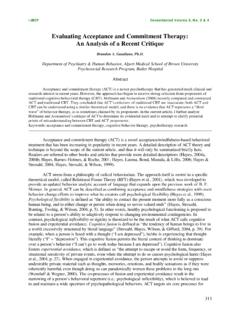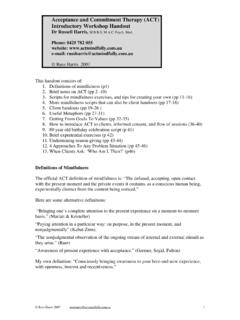Transcription of Thought Defusion Techniques - Blue Horizon Counselling …
1 Thought Defusion Techniques Do you say to yourself: I am a failure , I'm such an idiot , I am so dumb and make other hurtful remarks to yourself every time you encounter disappointment, setback, or distress? There is a way to defuse such potentially damaging reactions. If you often catch yourself being overly self-critical whenever you make a mistake, or something does not go according to a plan, it may be time to defuse' or remove the harm from your unhelpful thoughts. Defusion means learning to step back or detach from unhelpful thoughts and worries and memories: instead of getting caught up in your thoughts, or pushed around by them, or struggling to get rid of them, you learn how to let them come and go as if they were just cars driving past outside your house.
2 1 Thought Defusion is one of six processes in acceptance and commitment therapy (ACT) and it helps in developing psychological flexibility . You can defuse the thoughts that create an emotional turmoil and have a negative impact on you by learning to create a distance between yourself and your thoughts. You learn how to step back and watch your thoughts, rather than engaging in a struggle to convince yourself to think differently. It will provide you with an opportunity to respond effectively rather than react, getting tangled up or lost inside your thinking. 2. Example: Mike took a risk and decided to ask a girl out on a date. Unfortunately, she replied that she had a boyfriend. Straight away he felt embarrassed.
3 Immediately he Thought to himself: I am such a loser. At this moment, he could benefit from defusing this unhelpful Thought by using the following strategies: 1 flexibility - through- act/ 2 ;wap2 Mental appreciation He can acknowledge that his mind is very quick to react and he can thank his mind by saying: Thank you mind, but right now this response is not helpful . Create a distance Saying I'm having the Thought that I am a will create a distance from his Thought . Simply observe By observing and noticing the Thought : I have noticed that I have observed that Mike can increase the distance from his unhelpful Thought . Sound it out By saying a difficult Thought very, very slowly it becomes less potent. Alternatively, Mike could repeat his Thought aloud as many times as needed until it loses its power.
4 Sing it out Mike can sing his Thought out to the tunes of the song Happy Birthday', or any other song. Silly voices Mike can diminish its power further by saying the Thought in other voices a Donald Duck or Homer Simpson voice might do the trick. Remember, your mind is not always your friend. Your mind is often too quick to tell you what is wrong with you, and can become powerful over time if you meekly learn to listen to it. Sometimes don't listen to it, especially when it issues thoughts that are rather unhelpful and hurtful. You may become accustomed to such thoughts if you've tolerated them often enough, but that does not mean they are true. Don't just accept every Thought that pops into your head, choose to disagree with your mind.
5 Whatever Thought Defusion technique you choose is up to you, but make sure you pay attention when unhelpful and negative thoughts arise. Don't let yourself just be carried away by them. Similarly to Mike, we often encounter disappointments and frustrations in our lives. By practicing Thought Defusion Techniques we give ourselves a chance to live our life fully, take risks, challenge ourselves and grow stronger by overcoming adversities in our lives.




